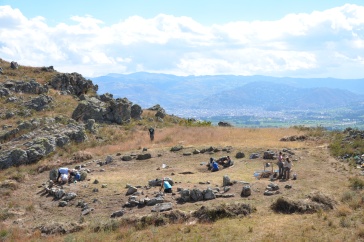
Betsy Carter, assistant professor of political science
Betsy Carter, assistant professor of?political science, has been awarded a U.S. Scholar Fulbright Foreign Scholarship to Spain for the spring semester of 2020. The award will support Carter while she teaches and conducts research at the Universidad Carlos III Madrid (UC3M). Carter will work with resident faculty of UC3M on joint projects while also gathering data to complete her book, “The Politics of Quality”— a study in the various wine markets of the world.
In her research, Carter asks, “Why are certain producers (in this case, wine producers) especially successful in creating a product whose value seems to transcend its constituent parts in some singular or intangible way?” Generally, the cost of a product is determined, partially, by the cost to produce the product minus the price a consumer pays. However, value can be added to a product if a consumer believes the product is intrinsically of higher value based on its geographic origin. Scientists still battle about whether a geographical region can produce a similar and distinct vintage, though a sommelier’s taste buds will tell you differently. The consumer may choose a favorite wine based on region and type but how much is that individual decision actually driven by politics and cooperation? As Carter explains, “In high value-added sectors, place of origin (“Made in”) can command a premium.”?
We don’t often think about the politics of wine and the impact regional producer cooperation may have on our wallet when making a wine selection, says Carter. She posits that politics can impact “effective market protection,” which in turn impacts whether a producer can claim regional branding, “shape brand access, brand control and market access.” Producer cooperation, or lack thereof, also shapes who “owns the brand” — the individual producer or the region — with significant consequences to both the level of market protection and the extent to which producers become “price-makers or price-takers.”
Carter will investigate her theory that political support and cooperation between producer organizations greatly contributes to adding that “it” factor that makes us, as consumers, place a higher value on the wine we choose.
Supporting the local community is also on the agenda for Carter. While in Spain, she plans to serve as a volunteer English teacher for women with limited economic means. She also hopes to perfect her Tortilla Espanola and find its perfect wine pairing.
-
Written By:
Caroline Leyva | College of Liberal Arts | Caroline.Leyva@unh.edu | (603) 862-5023



















































